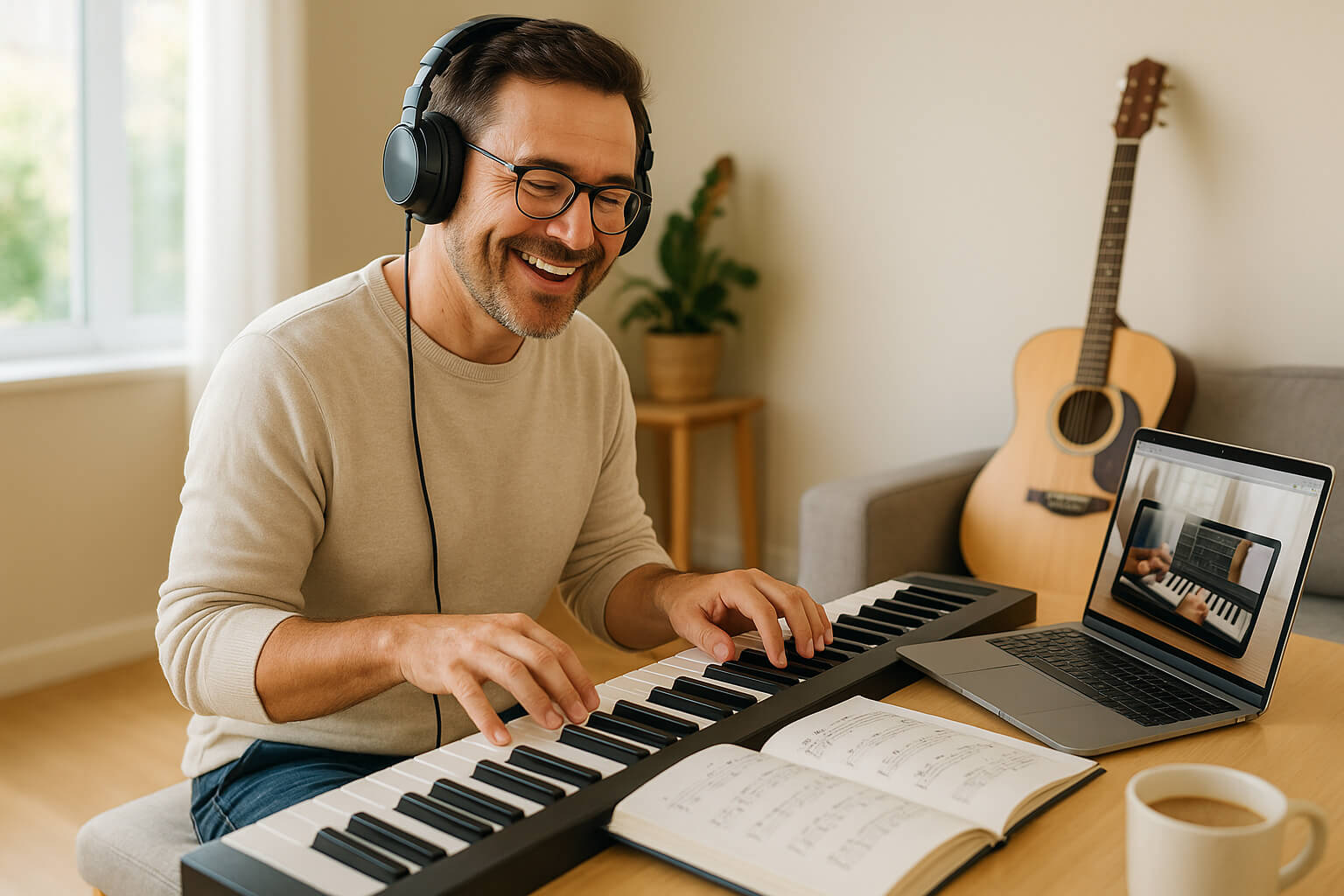How to Start Learning Music from Scratch at Any Age

It’s Never Too Late to Learn Music: Start Your Musical Journey Today (For Free)
It’s a myth that learning music is reserved for the young. The truth? Anyone can begin their musical journey at any age—whether you’re 18, 40, or retired and looking for a new passion project.
Modern technology has shattered the old barriers: no more expensive private tutors, no rigid class schedules, and certainly no need to feel “too late.” All you need is a spark of curiosity, a bit of daily practice, and the right (free) tools.
Here’s a step-by-step path to learning music from scratch, crafted for absolute beginners—no prior knowledge required, no costly lessons needed.
1. Choose Your First Instrument—or Start with Your Voice
The first decision is also the most exciting one: What instrument speaks to you?
- You don’t need fancy gear or a high-end setup. A basic keyboard, a simple acoustic guitar, or even your own voice is enough to begin.
- If you’re leaning towards piano, join a Free 7-Day Piano Challenge that walks you through hand positioning, basic melodies, and easy chord progressions.
- Guitar calling your name? Download a Beginner Guitar Chord eBook with clear diagrams and finger placement tips—ideal for self-paced learners.
- Still undecided? Spend a few hours browsing YouTube beginner instrument tutorials to see which instrument feels natural to you. Trust your gut—it’s your musical journey.
2. Learn Music Theory in Simple, Everyday Language
- Music theory often sounds intimidating, but it’s really just learning how music “speaks.”
- Start with the absolute basics:
- Note names (A, B, C…)
- Scales (major, minor)
- Rhythms & time signatures (4/4, 3/4)
- Chord patterns & intervals
- Visual, interactive guides like MusicTheory.net break these down into digestible, easy-to-understand lessons. No jargon, no pressure.
- When you’re ready to go deeper, explore why learning theory accelerates your progress—it’s not just about reading notes; it’s about understanding the why behind every song you play.
3. Daily Practice with Free Apps and YouTube Lessons
- You don’t need private lessons to make meaningful progress. Interactive apps like Yousician, Simply Piano, and Piano Academy provide step-by-step tutorials, instant feedback, and goal-based practice paths.
- Pair these with high-quality YouTube tutorials that cover every genre and style imaginable.
- To avoid the frustration that comes with “random” practice, use these proven practice strategies that help you stay consistent and focused. Even 15–20 minutes a day is powerful when practiced with intent.
4. Train Your Ear & Memory—Your Secret Superpowers
- Learning music isn’t just visual or mechanical; it’s aural and intuitive. Ear training teaches you to recognize melodies, intervals, and chords by sound, making learning songs much faster and more natural.
- Start with TonedEar’s free ear training exercises—designed for absolute beginners. Complement this with apps like Functional Ear Trainer to develop pitch recognition and melodic memory.
- Combine this with smart song memorization techniques that go beyond mindless repetition. You'll not only play songs—you’ll feel them, retain them, and even improvise around them.
5. Silence Self-Doubt: Adults Have Superpowers in Learning Music
- One of the biggest myths? “I’m too old to learn music.” Nonsense.
- Adults have advantages that children don’t:
- More discipline and patience
- Clearer goals and self-awareness
- A deeper emotional connection to music
6. Explore Creativity with AI Music Tools—Even as a Beginner
- Music isn’t just about playing notes—it’s about expressing yourself. And with modern tools, you can start composing and experimenting from Day 1.
- AI music platforms like Soundraw.io and Mubert Render let you generate original, royalty-free tracks by choosing genre, mood, tempo, and structure.
- Want a chill lo-fi beat to jam along with? Or a cinematic piano piece you can modify and remix? These tools give you instant creative freedom without needing professional composition skills.
- Explore how AI-generated music can enhance your learning and content creation with this guide on AI in music production.
Final Thoughts: You’re Not Late—You’re Perfectly on Time
Starting music at any age isn’t about catching up—it’s about opening a new chapter in your life. Whether you’re 20 or 60, the resources today mean you can:
- Start from zero knowledge
- Learn on your own time
- Express yourself in ways you never thought possible
You don’t need expensive lessons or fancy instruments. Between free chord books, interactive apps, and AI music tools, the only thing you truly need is consistency and curiosity.
- Pick Your Instrument.
- Learn the Basics.
- Practice with Purpose.
- Express Yourself Boldly.
It’s never too late to learn music—it’s only too late to never try.
